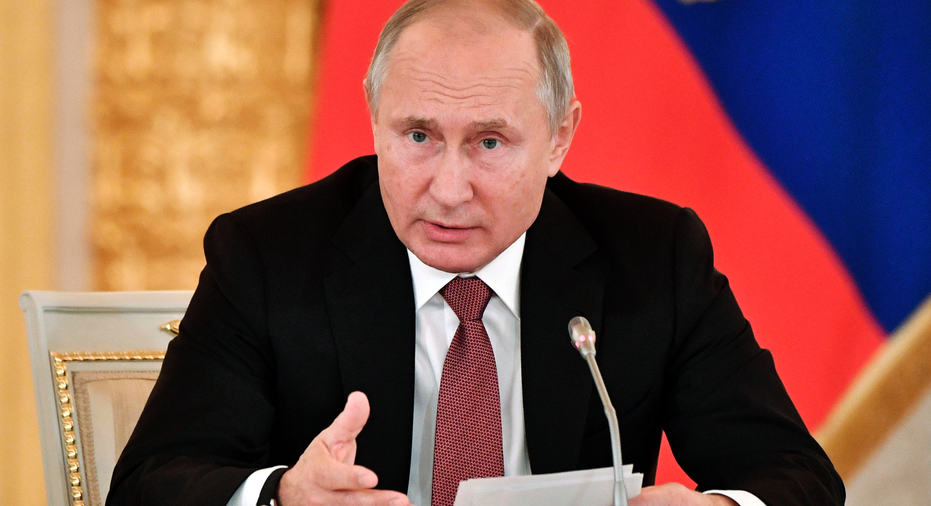Kremlin says it expects Putin-Trump meeting to go ahead

WASHINGTON – The Kremlin said Wednesday it still expects a meeting between President Vladimir Putin and President Donald Trump to go ahead as planned despite a suggestion from Trump that it could be canceled.
Trump, in an interview with The Washington Post on Tuesday, said he might cancel the sit-down with Putin in Argentina following Russia's seizure of three Ukrainian naval ships last weekend.
Kremlin spokesman Dmitry Peskov told reporters on Wednesday that the meeting is on and that Russia has not received "any other information from our U.S. counterparts."
Putin's foreign affairs adviser, Yuri Ushakov, noted that the meeting, which is set for Saturday, has been prepared through official channels and Moscow expects Washington to notify it of any changes in the same way.
"This meeting is necessary for both sides," Ushakov said. "It's important in view of the developing situation in the world."
The long-simmering conflict between Russia and Ukraine burst into the open on Sunday, when Russian border guards fired on three Ukrainian vessels and seized the ships and the crew.
In a phone call Wednesday, Trump and Turkish President Recep Tayyip Erdogan expressed their concern about the incident, said White House press secretary Sarah Huckabee Sanders. She said the two will further discuss it later this week during the Group of 20 summit in Buenos Aires, Argentina.
Trump said he would be receiving a "full report" from his national security team on Russia's recent actions in eastern Ukraine and the Black Sea. He said he would decide on a course afterward.
"Maybe I won't have the meeting," he said. "Maybe I won't even have the meeting."
Trump added: "I don't like that aggression. I don't want that aggression at all."
The comments were Trump's strongest to date in condemnation of Russia's recent actions in Ukraine, where tensions are flaring. But White House aides were still planning for the Putin meeting after Trump's comments.
Ushakov, Putin's aide, said the naval encounter between Russia and Ukraine likely will be on the agenda of the planned meeting, which will start with the two presidents meeting privately before being joined by senior officials.
He said the Kremlin expects that the talks will touch on nuclear arms control, noting that it's particularly important to discuss them in view of the U.S. intention to withdraw from the Intermediate-Range Nuclear Forces Treaty.
"It's extremely important to prevent an uncontrollable and senseless arms race," he said.
Ushakov said the two presidents also are to discuss regional crises, including the situation in Syria, the Iranian nuclear deal and North Korea.
The meeting between Trump and Putin is set to be just one of several high-profile foreign-policy engagements for the U.S. leader on the whirlwind two-day visit to Argentina. Trump also is set to meet with Chinese President Xi Jinping over dinner, in what may be a pivotal session to determining if and how the ongoing trade dispute between their countries could be resolved.
The White House on Tuesday warned Xi against trying to wait out Trump in the ongoing talks, suggesting the Chinese economy was not as resilient to a trade war as the U.S. economy.
The warning from Larry Kudlow, director of the National Economic Council, came ahead of the two leaders' high-stakes sit-down on Saturday evening. Over the last year, the two countries have levied a series of tariffs on hundreds of billions of dollars of imports from each other, with the latest round of U.S. duties set to go into force in the new year.
Xi said on Wednesday the international community needs to build consensus to solve the conflict between free trade and protectionism. In a speech to lawmakers in Spain, where he is conducting a state visit before attending the summit in Argentina, he said the world is facing "instability, uncertainty and hot topics without precedents in our history."
"I think we are at a crossroads," Xi said. "In economic terms we need to decide if we are going to follow the economic globalization and free market or if we are going to choose unilateralism and protectionism."
National security adviser John Bolton said Trump will also be meeting with German Chancellor Angela Merkel, Japanese Prime Minister Shinzo Abe, Argentine President Mauricio Macri, South Korea's Moon Jae-in and Indian Prime Minister Narendra Modi.
Sanders called the trip an opportunity for the president to cement relations with other world leaders and advance a global economic system based on "free, fair and reciprocal trade."
The Trump-Xi meeting would be the first since the two countries began hitting each other with import taxes earlier this year. The United States targeted $250 billion in Chinese products, and Beijing lashed back by slapping tariffs on $110 billion worth of U.S. goods. The two sides have been in negotiations for months, but Kudlow described them as being stalemated until just a few weeks ago.
Kudlow said the administration has been "extremely disappointed" by China's engagement in trade talks but the meeting between Trump and Xi on the sidelines of the G-20 summit could be a game-changer.
"Perhaps we can break through in Buenos Aires or not," he said.
Kudlow added that if the U.S. doesn't get "satisfactory" responses to its trade positions more tariffs will be imposed. He said Trump is "not going away."
"I hope they understand that," he said.
China's foreign ministry has said a recent phone conversation between Xi and Trump about trade and other issues was "extremely positive."
___
Associated Press writers Vladimir Isachenkov and Nataliya Vasilyeva in Moscow and Aritz Parra in Madrid contributed to this story.



















